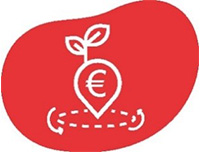On 15 and 16 June, the European Commission organised the Rural Pact Conference in Brussels, Belgium. The event brought together EU, national, and regional policy-makers alongside local authorities, social and economic stakeholders in a participatory event that reflected the rural vision’s ambition and bottom-up character.
It sought to engage participants in designing the governance of the Rural Pact and gather commitments for the achievement of the long-term vision for the EU’s rural areas.
SHERPA was well represented by various partners that joined the Conference after the 2-day meeting of the Consortium. The multi-actor approach was mentioned throughout the Rural Pact Conference, and this is exactly the added value of our SHERPA project.
“When talking about SHERPA, it was good to notice that the project was quite known and that there was most definitely interest in what we are doing as a group!”
Brigit Zomer, Ecorys
It was highlighted on various occasions the importance of having more accurate data, but also qualitative information to help put the data into the local context and reality. In this respect the Rural Observatory will be the one-stop-shop platform collecting evidence, data, indicators in one single place, and it will produce further indicators to fill in the gaps. All data gathered will be made publicly available through rural data platforms.
“There is a need for better data and evidence to support relevant and tailored action in rural areas. This means data at a high spatio-temporal resolutions, disaggregated (gender, age), and novel indicators that reflect the new challenges for rural areas (digitalisation, energy, agriculture, environmental resources, mobility and second-homes).”
Tristan Berchoux, SHERPA Partner (CIHEAM Montpellier)
SHERPA will aim to contribute actively to the Rural Observatory with evidence and findings of the projects and its Multi-Actor Platforms.
“For more than two years, the SHERPA project has been following closely the long-term vision for rural areas debate and has been actively contributing to it. We are thus looking forward to receiving more information regarding the timetable of the Rural Pact and how we can continue contributing to it.”
Elodie Salle, Project Coordinator (Ecorys)
The project has engaged with the Long-Term Vision for Rural Areas since its inception, having contributed to the public consultation with clear recommendations. At the start of 2022, SHERPA organised its annual conference on the topic of the vision, looking at how this can be implemented on the ground. A first set of recommendations were made as well for the future of rural policies, and a final set will be delivered at the end of the project.
The Rural Pact Conference gathered over 200 people in Brussels. The digital barriers were finally down, and we could all interact, network and share experience during the various workshops and group sessions. The objectives of the Rural Pact were in fact to amplify voices and strengthen collaboration, and the role of the pact will be to structure the action on the vision and monitor the commitments made.
“This participatory approach will be instrumental to the successful implementation of the pact, whether it is at local, regional, national or EU level.”
Elodie Salle, Project Coordinator (Ecorys)
The discussions held over two days covered many topics, from digitalisation, to research and innovation, to social economy and youth as change-makers in rural areas. These are the highlights of the event:

Digitalisation as a chance for rural areas. Digital connection should now be regarded as basic infrastructure to develop rural areas, their economic potential and offer the needed services. There is a clear need for digitalisation to be an inclusive process, involving all actors and people, to respond to the realities on the ground. Some ideas would be to create dedicated training programmes for rural digital champions; or develop local e-centres to boost up-skilling and digital literacy.
Sustainable mobility solutions to connect rural areas with urban centres. At the core of these solutions should be the proper involvement of citizens and stakeholders, in a co-creating process. Mobility needs to be thought in terms of access to social activities as much as for work and educational purposes, in order to make it attractive to young people. It might be wise to think less about connecting villages with cities, and focus on connecting village to village.

Social economy as catalyst to boost resilience and town transition in rural areas. Social economy is seen as ‘filling the gap” in missing services and infrastructure in rural areas. However, there is much more to it and this has to be recognised and awarded. Reducing the administrative burdens could help support rural social enterprises to flourish.

Rural youth as leaders of change. Youth can be regarded as having a strategic role in the digital transition and smart villages. There is definitely a need to focus on concrete needs and interest of youth in rural areas, ensuring affordable and easy mobility solutions for both educational and professional life.
Rural research and innovation ecosystem. A very important take-away focused on Horizon call for proposals that should fit the local and regional needs of rural areas.
Place-based approaches for rural development. Focus on “smart” multi-funding, developing a local vision at territorial level. There is a need for a smooth multi-funded LEADER/CLLD approach. Member States’ decision-makers are not taking up the current model. Strong leadership and shared knowledge centres are key for rural development.

Community-driven sustainable energy action in rural areas. There is a high importance of communicating from EU to national, regional and down to the local level, and explain what are the benefits of rural energy communities, why they are important and what can everybody gain from it.
Services for socially resilient and welcoming rural areas. Think across border of countries, regions, to ensure health services. Collaborate among villages but also across sectors and create public-private partnerships. Health services should not be solely a local responsibility. Need for integrating migrants and refugees, for them to be part of our rural communities and allowing people to remain in villages.
Strategic role of rural areas for climate and food security. Designing local and sub-regional strategies for sustainable and resilient food systems with municipalities. Funds to support small-scale farms.
The diversity of the participants brought along various experiences, knowledge and opportunities to exchange and learn from each other. Our SHERPA team had quiet some interactions during the two days, presenting the findings of the project and absorbing all information and projects shared.
“I was impressed with the range of stakeholders that travelled from all over Europe, and it was really interesting to hear about new projects that I had not seen before, from ‘biodistricts’ in Italy to ‘rewetting peatlands’ in the Netherlands.”
Harriet Bradley, SHERPA Partner (IEEP)
All presentations, pictures and recordings are available on the Rural Pact Conference webpage.
